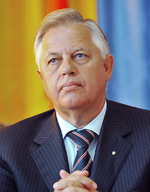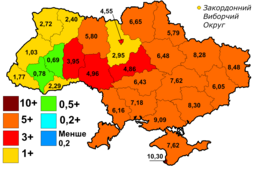Communist Party of Ukraine
| Комуністична партія України Communist Party of Ukraine |
|
|---|---|

|
|

|
|
| Party leader | Petro Symonenko |
| Secretary General | Petro Symonenko |
| Emergence | KP (b) U April 18, 1918 |
| founding | June 19, 1993 |
| Alignment |
Communism Marxism-Leninism |
| Colours) | red |
| Parliament seats |
0/317 |
| International connections |
UdKP-CPSU International Meeting of Communist and Workers' Parties |
| Website | www.kpu.ua |
The Communist Party of Ukraine ( KPU , Ukrainian Комуністична партія України, Komunistytschna Partija Ukrajiny ; Russian Коммунистическая партия Украины, Kommunisticheskaya partija Ukrainy ) is the oldest political party of today's Ukraine .
history

The party was founded on April 18, 1918 under the name Communist Party (the Bolsheviks ) of Ukraine , abbreviated KP (b) U , in Taganrog . As early as July of the same year, the official 1st party congress of the CP (b) U in Moscow decided the party's entry into the Communist Party of Russia and was henceforth merely a regional division of the Soviet state party, later known as the CPSU . In 1952 the addition "Bolsheviks" was deleted. The party has had its current name since then. In August 1991, after the failed coup in Moscow, it was banned. Many of its members then joined the Socialist Party (SPU). In 1993 the KPU in Donetsk was re-established as an independent Ukrainian party and became one of the largest parties in Ukraine. Petro Symonenko is the chairman to this day . Despite its re-establishment, the KPU sees itself as a direct continuation of the Communist Party of the Ukrainian Soviet Republic . Although it began counting its party congresses again in 1993, the counting of the party congresses of the Soviet-Ukrainian Communist Party will also continue. The founding party congress of today's KPU in 1993 was the "I. (XXIX.) Party Congress".
In the parliamentary elections in 1994 , the KPU succeeded in entering the Verkhovna Rada . In the presidential election in the same year, she did not put forward a candidate of her own, but supported the chairman of the SPU, Oleksandr Moros , who lost to Leonid Kuchma .
In the 2004 presidential election , which resulted in the so-called " Orange Revolution ", the KPU lost much of its approval and developed into one of the smaller parties represented in the Ukrainian parliament. A large part of their electorate switched to the Party of Regions , which in the run-up to the presidential election switched to a left-wing populist course and also represented traditional communist positions with its Russia-friendly foreign policy.
From 2006, the KPU was involved in the government under Prime Minister Viktor Yanukovych . In the parliamentary elections in 2012 it was able to win significantly in votes, the KPU received 13.2% of the vote and 32 seats in the Verkhovna Rada.
Attempts to ban parties
On August 21, 1991, after the collapse of the USSR and Ukraine's declaration of independence, the Ukrainian government initiated proceedings to ban the party against the KPU. The Presidium of the Verkhovna Rada issued two decrees. They aimed to ban the previously ruling CPSU or KPU and their activities.
The first decree was issued on August 26, 1991 and suspended the activities of the three million members of the strong party. In addition, the party's bank accounts were frozen and the party's property was seized until its role in the failed coup - the August coup - was properly established by the courts.
The second decree, issued just four days later, on August 30, 1991, banned the KPU. The reason for the decree was the aid to the coup by the KPU. A violation of Article 7 of the Ukrainian Constitution, which was still in force from 1978, which saw it as a violent change to the constitutional order. The ban on the KPU had a significant effect - all party property and assets now went to the newly independent state of Ukraine.
When the Ukrainian Constitutional Court was created in 1996 by the new constitution, 130 MPs of the Communist Party filed a constitutional complaint with it. They called on the Ukrainian Constitutional Court to lift the ban on the KPU as the party ban proceedings suffered from two serious flaws.
Despite differing votes within the Constitutional Court, it found itself competent and decided on the prohibition procedure carried out. The ban on the KPU was lifted, then the party order, the party registered in July 1991 was readily compatible with both the current and the old constitution, because the party order stipulated that the laws and the constitution of the country were respected . The Ukrainian Constitutional Court also found that the ban on the KPU violated the fundamental right of freedom of assembly.
After the removal of President Yanukovych in February 2014, the KPU was the target of attacks by supporters of the Euromaidan . The party headquarters in Kiev was temporarily occupied, other offices of the party were devastated or set on fire with Molotov cocktails . Some of the KPU MPs in the Verkhovna Rada have been threatened and put under pressure. In a resolution adopted on February 27, 2014, the European Parliament condemned the attack on the headquarters of the KPU. On April 10, the party headquarters was evacuated by the occupiers by court order, and the rooms were set on fire. On May 6, 2014, the KPU faction was expelled from the Verkhovna Rada meeting for allegedly supporting separatism in eastern Ukraine. On July 8, 2014, Justice Minister Petrenko applied to the regional administrative court to ban the KPU. There is ample evidence of illegal activities by the party, including openly sided with the pro-Russian separatists who have been fighting for the independence of several regions in eastern Ukraine since April and the party also supports the separatists with money and arms. On July 24, 2014, Parliamentary President Oleksandr Turchynov declared the communist faction in the Rada to be dissolved after a law had come into force two days earlier, which gave Turchynov the power to make this decision. In the 2014 parliamentary elections , the KPU failed because of the five percent hurdle, making it the first time it is not represented in the parliament of Ukraine. According to a Ukrainian news agency, on April 17, 2015 the regional council of the Ukrainian Ivano-Frankivsk Oblast banned the KPU and three other separatist opposition parties.
On December 16, 2015, the Kyiv District Administrative Court decided to ban the KPU in Ukraine.
General Secretaries
General secretaries (chairmen) of the KPU were:
- Georgi Pyatakov (1918)
- Serafima Gopner (1918)
- Emmanuel Quiring (1918-1919)
- Stanislaw Kossior (1919)
- Rafail Farbman (1920)
- Vyacheslav Molotov (1920–1921)
- Dmitri Manuilski (1921–1923)
- Emmanuel Quiring (1923-1925)
- Lasar Kaganowitsch (1925–1928)
- Stanislaw Kossior (1928–1938)
- Nikita Khrushchev (1938–1947)
- Lazar Kaganovich (1947)
- Nikita Khrushchev (1947–1949)
- Leonid Melnikow (1949–1953)
- Alexei Kirichenko (1953–1957)
- Nikolai Podgorny (1957–1963)
- Pyotr Schelest (1963–1972)
- Vladimir Shcherbitsky (1972–1989)
- Vladimir Ivashko (1989–1990)
- Stanislaw Hurenko (1990–1991)
- Petro Symonenko (since 1993)
Strongholds
The KPU always achieved its best results in the eastern and southern Russian-speaking parts of the Ukraine and on the Crimean peninsula . In Western Ukraine, approval for the KPU was significantly weaker.
Election results
- Parliamentary election 1998 : 24.7%
- Parliamentary election 2002 : 20.0%
- Parliamentary election 2006 : 3.7%
- Parliamentary election 2007 : 5.4%
- Parliamentary election 2012 : 13.2%
- Parliamentary election 2014 : 3.9%
Active politicians
The KPU's first list positions in the 2007 parliamentary elections were:
- Petro Symonenko
- Jewhen Wolynez
- Maryna Perestenko
- Ivan Herasymov
- Yuri Hajdaev
- Adam Martynjuk
- Valery Bews
- Oleksandr Tkachenko , former Speaker of Parliament
- Oleksandr Holub
- Ihor Aleksjejew
Youth organization
The youth organization of the KPU is the Lenin Communist Youth Association of Ukraine (Leninski kommunistitscheski sojus molodjoschi Ukrajiny) . So she kept the name of the youth organization of the CPSU (see Komsomol ).
criticism
The author Roman Danyluk accuses the KPU of a pro-Russian backward-looking attitude. The party does not take part in social movements, but is more interested in Soviet nostalgic identity and memory politics. Her policy is very state-fixated and relies exclusively on institutions and a corresponding legalism. Membership is riddled with old cadres and apparatchiks from the Soviet era and is hopelessly outdated. Furthermore, racist and homophobic content can be found in their party newspaper.
Web links
- Side of the KPU
- Website of the youth organization ( Memento from December 26, 2013 in the Internet Archive )
Individual evidence
- ↑ http://parties-and-elections.eu/ukraine.html
- ^ Website of the Central Election Commission for the parliamentary elections 2012 ( Memento of October 30, 2012 in the Internet Archive )
- ↑ Про тимчасове припинення діяльності Компартії України N 1435-XII, August 26, 1991, Указ, Президія Вирховння, Decree of the party of 1435 the Verkhovna Rada.
- ↑ Leonid Shmatenko: The role of the constitutional court in young democracies, especially in Ukraine . GRIN Verlag, Munich 2010, ISBN 978-3-668-62691-1 , p. 30 .
- ↑ Про тимчасове припинення діяльності Компартії України N 1435-XII, August 26, 1991, Указ, Президія Вирховння, Decree of the party of 1435 the Verkhovna Rada.
- ↑ a b c d Leonid Shmatenko: The role of the constitutional court in young democracies, especially the Ukraine . GRIN Verlag, Munich 2010, ISBN 978-3-668-62691-1 , p. 30-31 .
- ↑ Про заборону діяльності Компартії України, N 1468-XII, August 30, 1991, Указ, Президія Верховної Ради України, Decree of the Communist Party of Ukraine, Dec. Verkhovna Rada.
- ↑ Конституційний Суд; Рішення, Окрема думка вiд 27. 12. 2001 № 20-рп / 2001 - Ukrainian Constitutional Court; Decision of December 27, 2001 No. 20-rp / 2001
- ^ Death lists and Molotov cocktails , background on February 27, 2014
- ↑ The office of the Communist Party in Kiev stormed ( memento of March 6, 2014 in the Internet Archive ), Die Zeit, February 23, 2014
- ^ Resolution of the European Parliament of February 27, 2014
- ↑ В Киеве горел центральный офис Компартии , Ukrinform of April 10, 2014
- ^ Crisis session of the Kiev parliament , NZZ of May 6, 2014
- ↑ Ukraine wants to ban Communist Party , Der Standard of July 8, 2014
- ↑ Power struggle in Kiev: Ukraines government wants to ban Communist Party , SPON of July 24, 2014
- ↑ Süddeutsche Zeitung of October 27, 2014
- ↑ Interfax-Ukraine, April 17, 2015: Ivano-Frankivsk Regional Council bans activities of Communist Party, Regions Party, Opposition Bloc, Ukraine Development Party
- ↑ Ukrainian authorities have banned the Communist Party (in Russian) . Lenta.ru . December 16, 2015. Accessed July 25, 2020.
- ↑ http://www.cvk.gov.ua/vnd2007/w6p001.html ( Memento from June 5, 2009 in the Internet Archive )
- ↑ Roman Danyluk: KIEV INDEPENDENCE SQUARE - history and background of the movement on the Maidan. Edition AV, Lich 2014, ISBN 978-3-86841-106-5 . Page 35


